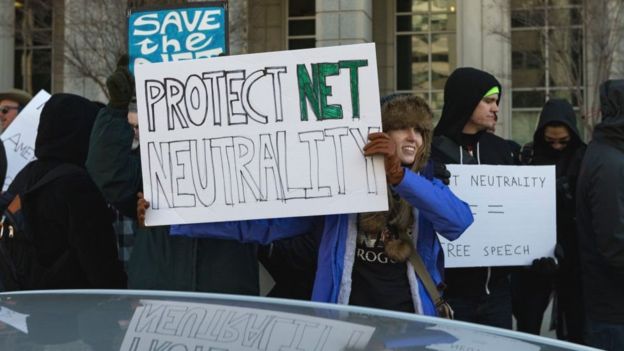Net neutrality: The internet holds its breath
Thu Dec 14, 2017
But later this Thursday, a vote will almost certainly reinterpret an older law used to underpin how it is applied in the US - ending a ban on internet service providers (ISPs) being able to put the brakes on some websites' data and accelerate others'.
Some believe that threatens the very fabric of the internet.
Like many of the great American laws, the Communications Act of 1934 was written by a bunch of men who had absolutely no idea what they were doing.
That's not a criticism. Who could have foreseen, as they put pen to paper, that one day their words would be used to govern how bits and bytes are streamed and downloaded, through copper, glass and radio-waves, under and overground, across our oceans and even into space?
Sometimes, though, the most effective laws are about establishing a broad principle - in this case the idea that companies providing telecommunications must do so without discrimination.
Should that rule - known as Title II - apply to the companies that provide Americans with the internet?
It did, but now it won't.
The pioneers of the internet are unequivocal: losing net neutrality will be nothing short of a catastrophe, for innovation, free speech and free expression.
Yet the man orchestrating the change calls that notion 'hysteria'.
We're about to find out who's right.
Will untying the ISPs hands foster innovation, or cause the wider industry to hit the buffers?
Verizon's puppet?
The decision will be made on Thursday by the five-person board at the US Federal Communications Commission (FCC). It will almost certainly, barring a last-minute unexpected twist, vote to overturn a decision in 2015 that said Title II should apply to internet service providers.
Since President Trump took office, the balance of power at the FCC has shifted to the Republicans. And this vote was brought to the front of the agenda by Ajit Pai, the president's pick to be the FCC's chairman.
Mr Pai has been on the FCC board for more than five years. He's had a career mostly in government, aside from a period beginning in February 2001, when he worked at Verizon as a lawyer.
'Ah ha!' say campaigners, who believe Mr Pai's past is an obvious conflict of interest and the motivation behind this move. Verizon, one of the biggest telecoms companies in the world, stands to benefit greatly from a loss of net neutrality.
But conversely, who better to know how the companies will react than a man who knows the business intimately?
The perceived line between expertise and vested interest is extremely thin.
In a brazen after-dinner speech last week, Mr Pai responded to the negative claims by mocking them. He showed a video comedy skit in which he attends a fictional meeting with a Verizon lawyer.
'We want to brainwash and groom a Verizon puppet to install as FCC chairman,' the lawyer says to Mr Pai.
'Awesome,' he replies.
SOURCE: BBC NEWS


Write Your Comments